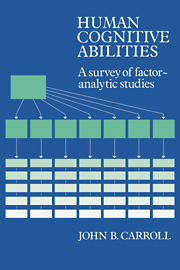Book contents
- Frontmatter
- Contents
- Preface
- PART I INTRODUCTION TO THE SURVEY
- Chapter 1 The Study of Cognitive Abilities
- Chapter 2 Historical Foundations of the Study of Cognitive Abilities
- Chapter 3 Survey and Analysis of Correlational and Factor-Analytic Research on Cognitive Abilities: Methodology
- Chapter 4 Survey and Analysis of Correlational and Factor-Analytic Research on Cognitive Abilities: Overview of Outcomes
- PART II THE IDENTIFICATION AND DESCRIPTION OF COGNITIVE ABILITIES
- PART III ISSUES
- References and List of Datasets
- Appendix A Codes for Countries, Samples, and Factors
- Appendix B Hierarchical Factor Matrix Files
- Name Index
- Subject Index
Chapter 4 - Survey and Analysis of Correlational and Factor-Analytic Research on Cognitive Abilities: Overview of Outcomes
Published online by Cambridge University Press: 29 September 2009
- Frontmatter
- Contents
- Preface
- PART I INTRODUCTION TO THE SURVEY
- Chapter 1 The Study of Cognitive Abilities
- Chapter 2 Historical Foundations of the Study of Cognitive Abilities
- Chapter 3 Survey and Analysis of Correlational and Factor-Analytic Research on Cognitive Abilities: Methodology
- Chapter 4 Survey and Analysis of Correlational and Factor-Analytic Research on Cognitive Abilities: Overview of Outcomes
- PART II THE IDENTIFICATION AND DESCRIPTION OF COGNITIVE ABILITIES
- PART III ISSUES
- References and List of Datasets
- Appendix A Codes for Countries, Samples, and Factors
- Appendix B Hierarchical Factor Matrix Files
- Name Index
- Subject Index
Summary
To what extent are the several traits of the body, of the senses and of mind interdependent: How far can we predict one thing from our knowledge of another? What can we learn from the tests of elementary traits regarding the higher intellectual and emotional life?
James McKeen Cattell and Livingston Farrand (1896)This chapter is devoted, first, to the description of the 477 datasets that were initially selected for analysis in this survey. It presents statistics on various characteristics of these datasets, on the types of analysis that were employed, and on the general outcomes. Second, it tells how the results of the survey are to be presented in subsequent chapters.
Since the initial preparation of this chapter and its tables, a handful of datasets were dropped from the database for various reasons, chiefly because some were found not to be in the public domain. Also, a small number of datasets – fewer than a dozen – were added to the database, either because they had earlier been overlooked or because they were published subsequent to the initial selection of datasets that occurred in 1985. Nevertheless, the tables of information presented in this chapter, based on the datasets initially selected, can be taken to give trustworthy (albeit approximate) characterizations of the datasets actually employed in the survey.
- Type
- Chapter
- Information
- Human Cognitive AbilitiesA Survey of Factor-Analytic Studies, pp. 115 - 142Publisher: Cambridge University PressPrint publication year: 1993



